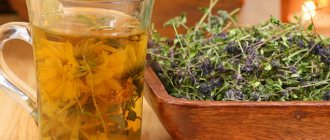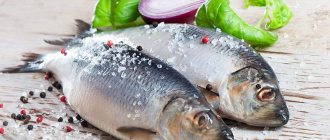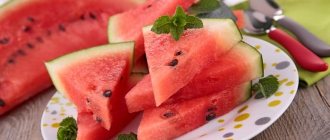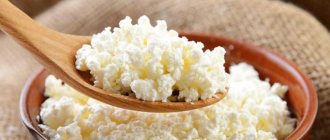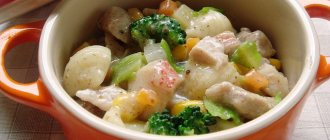Today's housewives have long been accustomed to the fact that ginger can be used not only as an additive to tea, but also as a medicine. This product is especially interesting for breastfeeding women. After all, not only do you need to diversify the already meager menu, but few medications are allowed during lactation. So young mothers are tormented by the question - is it possible to use ginger while breastfeeding, and if so, in what form.
Ginger root is not only allowed, but also recommended for use by mothers while breastfeeding if the baby does not react to it.
Ginger root and its benefits during lactation
The rich and valuable composition of ginger can definitely bring maximum benefits to the body. After all, it contains substances such as:
- Vitamins A, C, PP, almost the entire group B.
- Useful minerals are iron, zinc, phosphorus and calcium.
- Proteins.
- Essential amino acids and essential oils.
Together, all the components give ginger many beneficial properties, thanks to which it:
- normalizes appetite, which promotes normal digestion;
- protects against viral diseases, improves immunity;
- increases tone, gives strength and strengthens overall health;
- normalizes metabolism;
- relieves signs of fatigue, improves mood and prevents the development of depression;
- strengthens the walls of blood vessels and increases their elasticity;
- helps relieve minor headaches, menstrual pain in women or muscle pain;
- stops attacks of nausea or vomiting;
- removes unnecessary toxins and waste from the body;
- protects the body from possible parasites;
- copes with wound healing and is also used for a bactericidal effect.
Having so many beneficial properties, ginger is not only allowed for use during breastfeeding, but is also recommended. Penetrating with breast milk to the newborn, beneficial microelements and vitamins also reach him. In addition, ginger helps to cope with one of the most important tasks in caring for a baby - eliminating intestinal colic and gas formation in the baby. Since, when freed from most toxins, breast milk retains its best qualities, it is considered purer and healthier, which means the baby perceives it better.
The iron contained in the root vegetable is considered a means of preventing anemia, a disease that many women suffer after pregnancy and childbirth.
Freshly brewed ginger tea can increase lactation in nursing women. In addition, this drink is also allowed for women who want to restore their figure after childbirth. Ginger as a seasoning can be added to many diet menu recipes for nursing women; this will diversify the diet and give dishes a new taste.
Benefits of ginger during breastfeeding
Ginger root is a storehouse of useful vitamins and microelements.
It includes:
- Vitamins of group B, A, C, PP.
- Useful minerals (zinc, iron, calcium, phosphorus).
- Proteins.
- Amino acids and valuable essential oils.
Thanks to such a rich composition, ginger has many beneficial properties:
- Normalization of healthy appetite and restoration of normal digestion.
- Antiviral effect and increased immunity.
- General strengthening of the body and increased tone.
- Normalization of metabolic processes.
- Fight chronic fatigue, depression and stress.
- Strengthening and increasing the elasticity of blood vessels.
- A slight antispasmodic effect helps in the fight against headaches, menstrual and muscle pain.
- An excellent remedy in the fight against nausea and vomiting.
- Cleansing the body of waste and toxins.
- Natural antiparasitic agent.
- Wound healing and bactericidal effects.
An extensive list of beneficial properties makes ginger root an excellent product for a nursing mother. In addition, beneficial substances, penetrating into breast milk, have a positive effect on the child’s body. And thanks to the fact that ginger cleanses a woman’s body of toxins, breast milk becomes more beneficial and the baby suffers noticeably less from colic and gas. The iron content of the root provides excellent prevention and treatment of anemia, an ailment that affects many women after childbirth. Another beneficial property of ginger root for mothers is its positive effect on the volume of lactation, the effect is especially noticeable when drinking tea based on this spice.
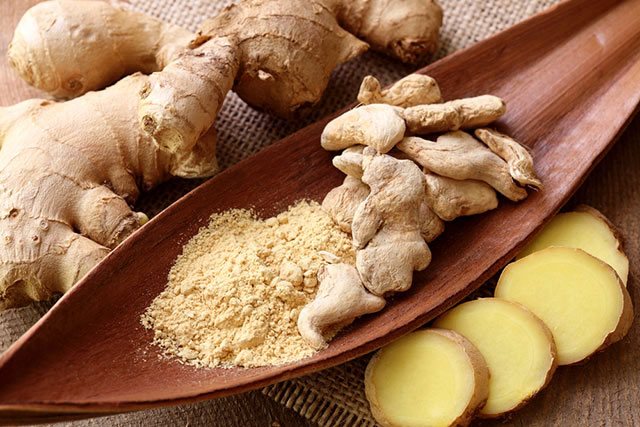
Ginger is very useful in the cold season, as its high vitamin C content helps resist seasonal colds.
Another undoubted advantage of ginger root during lactation is its bright taste. The diet during breastfeeding is quite bland, and this seasoning perfectly diversifies the taste of usual food. You can add it to both main dishes and desserts. Aromatic ginger tea is very popular. And thanks to the low calorie content of the product, even those mothers who are struggling with extra pounds can consume it without fear.
What harm can ginger cause when breastfeeding?
You should try the aromatic root with extreme caution only if the young mother had not tried this ingredient before, before breastfeeding. For both the woman and the child, a potential source of danger in this case may be individual intolerance. In a baby, it can manifest itself in the form of allergies or gastrointestinal disorders, which can cause constipation or, conversely, loose stools, colic, increased gas formation, rashes all over the body, and even swelling. Similar symptoms may also appear in the mother herself, if the product was not previously familiar to her.
Breastfeeding mothers are also not recommended to use ginger in case of sleep disturbances in the baby and increased nervous excitability.
If something similar is noticed in a baby, then it is better to refuse drinks and dishes with the addition of ginger.
Rarely, but still, a reaction has been observed in some children in the form of refusal to breastfeed after their mother ate a healthy root vegetable. Ginger may slightly affect the taste of mother's milk, which an overly sensitive baby will notice and may eat without much desire. If such a reaction is noticed in a child, then you should also not introduce the product into your regular diet.
When it is prohibited
Ginger when feeding can help, but it can also become a source of health problems. Its taste is somewhat unusual, but this is precisely why it attracts most gourmets. But sometimes this spice is contraindicated. Ginger should not be consumed by nursing mothers if:
- the presence of diseases of the gastrointestinal tract (gastritis, ulcers, etc.);
- hypertension, arrhythmias;
- liver diseases;
- hemorrhoids;
- bleeding.
- pathologies of the cardiovascular system.
Breastfeeding mothers are strictly prohibited from taking ginger if they are also prescribed medications to improve the functioning of the heart, blood vessels, or high blood pressure.
Sushi and roll lovers cannot imagine a complete delicacy without pickled ginger. However, you should not abuse it - it puts a lot of stress on the liver of mother and child.
If a mother eats ginger, she needs to carefully monitor the baby’s reaction. If the baby has abnormal stools, or there are symptoms of allergies or colic, the spice should be immediately removed from the diet. Perhaps this product is not suitable for a particular toddler and you should postpone its use for a while.
Thus, lactation and ginger are quite compatible if the baby responds well to the spice, and also if there are no contraindications from the mother’s body.
What are the contraindications for using ginger root?
In addition to the side effects of consuming the root, there are a number of obvious contraindications for which you should also avoid using it:
- ulcers, gastritis and other gastrointestinal diseases;
- arrhythmia;
- last months of pregnancy;
- hypertension;
- increased and persistent body temperature;
- Botkin's disease;
- liver-related diseases;
- all kinds of bleeding and hemorrhoids.
If a young mother has any diseases or complications from this list, then you should not use ginger root.
Drug compatibility
Since in some cases the aromatic roots are used as a medicine, you should not combine the use of ginger with certain medications. For example, ginger is not compatible with drugs that reduce blood clotting, blood pressure and sugar. Also, you should not combine the root with cardiac stimulants and antiarrhythmic drugs. In combination with such remedies, aromatic spice can either enhance or reduce the effect of these remedies. At best, this will not bring any benefit from taking medications, and at worst, it will aggravate the situation and lead to complications.
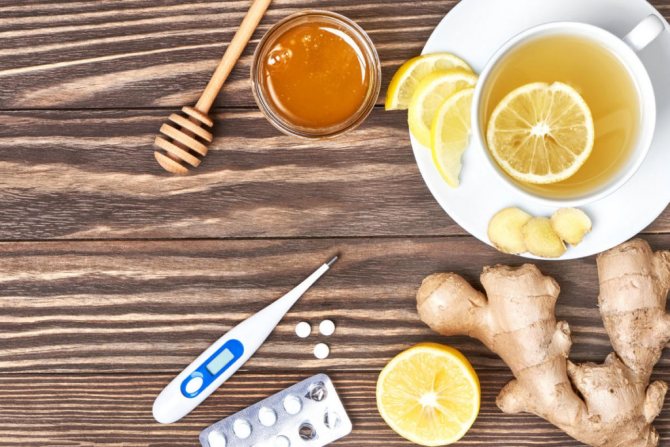
With rare exceptions, the use of ginger is compatible with taking medications.
How to use ginger correctly
If a woman nevertheless decides to use ginger while breastfeeding her newborn, she should understand the full extent of her responsibility for this process. It is important to know that if the mother has never eaten ginger, you should not start eating it during such a tender period - the reaction of the body of both the mother and her newborn child can be unpredictable.
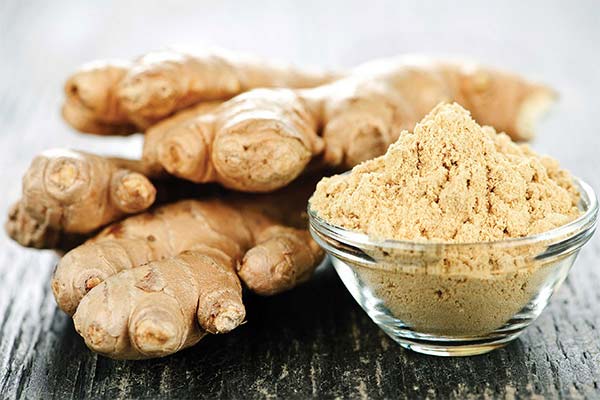
How much can you eat per day
It is believed that consuming ginger helps improve lactation and increase the amount of breast milk. But experts insist that this product should be introduced into the diet when the child is two months old. It is better to eat ginger in the first half of the day, preferably before lunch; the dosage of the product should not exceed 3 grams. After eating a new product for the first time, the mother should monitor the baby’s condition - if no negative reactions were noticed during the day, you can continue to eat ginger. If the baby accepts the product normally, it is allowed to slightly increase the dosage daily.
A woman should understand that ginger has blood thinning properties. That is why it is not recommended to use ginger if there was bleeding after childbirth, including hemorrhoids. Ginger also has an effect on the mucous membranes of the gastrointestinal tract, so if you have diseases of the intestines and stomach, you should avoid the product. Ginger is also not suitable for women with high blood pressure; it can harm mommy.
Is it possible to eat at night and on an empty stomach?
Since ginger is a strong irritant, it is strictly not recommended to use it on an empty stomach and before bed. With such a diet, the beneficial elements of ginger will not be absorbed, and a negative reaction from the body will follow immediately. You should also not consume ginger before bed because it has tonic properties, increases blood pressure and, accordingly, can cause sleep disturbances.
The best option is to consume a small amount of ginger in the first half of the day after meals, for example, immediately after lunch. Thus, the stomach and intestines are protected by other foods, and the negative impact will be minimal. It is not recommended to drink ginger tea at night, as it can have an effect on the central nervous system.
What rules for using ginger root should you follow during gw?
If before pregnancy and during pregnancy a woman tried to eat dishes with a healthy root, then you can also use ginger during lactation. But at the same time, you should adhere to some simple rules in order to get only the benefits of a useful product. The main ones:
- After giving birth, at least three months must pass before a nursing mother can eat ginger. This is the case if the product is already well known to the woman’s body;
- If ginger root is a new ingredient for a young mother, then the baby should be introduced to this spice as late as possible. That is, a woman should not try the product before 7 months of breastfeeding. At this age, the child will no longer react so sharply to new ingredients, which means the risk of allergies will be reduced;
- It is better to carry out the first test in the morning, in a small amount, so that by the evening you can notice possible changes in the baby’s condition;
- after the first test, you need to wait a few days, watch the baby and only if the perception is positive, continue to eat the valuable supplement and drink drinks with ginger, and over time increase the portion to the maximum possible;
- If you have the slightest doubts or concerns about the baby’s health, it is better to consult a pediatrician. Only the attending physician will tell you whether mom can try the spice or not.
Is it possible to pickle ginger while breastfeeding?
Pickled root can often be found as a supplement or seasoning for food. But it is better for a nursing woman not to try such food. Since, firstly, it is unknown what substances were used in the marinade, and secondly, pickled products are not recommended for use during lactation. You can replace this spice with dried or fresh ginger. Only a fresh natural product will bring maximum benefit.
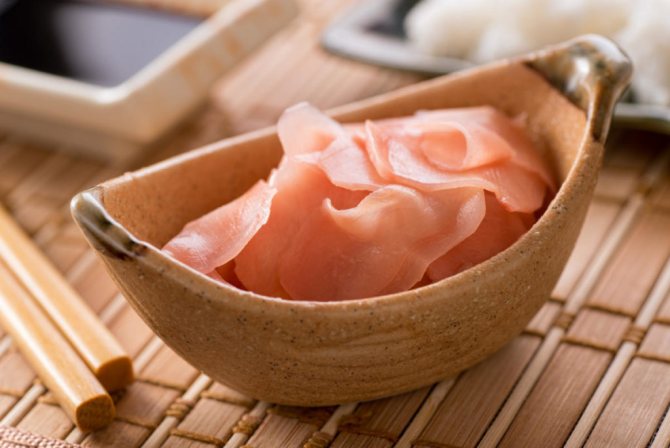
Pickled ginger is not recommended for use during breastfeeding.
How ginger can harm you while breastfeeding
If a woman has not consumed ginger root during pregnancy, then during breastfeeding she needs to be very careful when trying this product. The main harm of ginger for a nursing mother and baby is possible individual intolerance. Allergies in a baby can manifest as indigestion (colic, gas, diarrhea, constipation), rashes and redness on the body or swelling. Something similar can await the woman herself if the product is new to her.
Another side effect of consuming ginger root by a nursing mother can be increased excitability and poor sleep in the baby. This is also a form of individual intolerance, and in this case the product will have to be excluded from the diet.
In rare cases, it may happen that the child does not like the taste of milk after the mother has eaten ginger. The baby will eat reluctantly or will give up breastfeeding altogether. It is necessary to carefully observe the baby, and if a pattern is identified, then this product will have to be abandoned for the entire period of breastfeeding.
Recipe for making ginger tea while breastfeeding
To prepare healthy ginger tea while breastfeeding, you need to take:
- ginger root;
- boiled water;
- usual tea leaves, sugar, lemon or honey.
The fresh root is peeled, grated, and poured with a small amount of boiling water. Infuse and drink in pure form or with the addition of the above ingredients. A tea break will not only replenish the supply of vitamins, but will give mom a little rest, enjoy the pleasant aroma and spicy taste.
Lifehack! To easily peel the ginger root, you can use a teaspoon and scrape off the top layer of ginger.
Useful properties of ginger
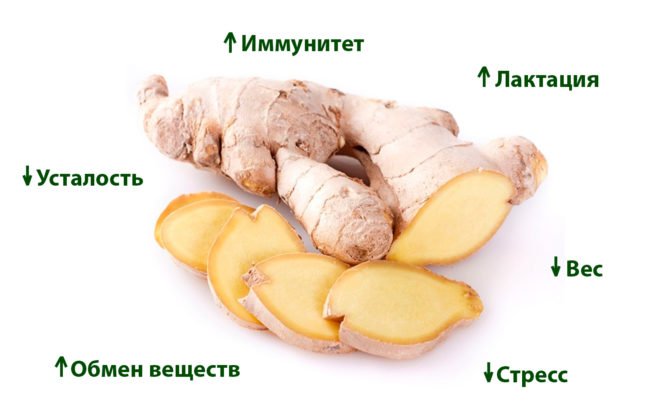
Ginger is rich in nutrients and vitamins. Some components: aluminum, chromium, choline, manganese, zinc, iron. It is rich in amino acids that are of great value to the body. The question often arises: can a nursing mother use it in her diet or not? Using the plant as a supplement will provide exceptional benefits. Ginger during breastfeeding (BF) can and even should be included in the diet: it has a bright, pungent taste and will perfectly complement tea with lemon or honey.
Beneficial properties of the root during breastfeeding:
- Boosting immunity.
- Helps relieve feelings of fatigue.
- Increases lactation.
- Reduces weight.
- Increases resistance to stress.
- Improves metabolism.
During pregnancy, this plant is no less useful, but in moderation, especially its properties will help with toxicosis. The root vegetable relieves nausea, reduces salivation and prevents vomiting. The trace elements contained in ginger are essential for nursing mothers.
Ginger as a medicine for breastfeeding
For women who are breastfeeding, any traditional medicine seems to be a salvation during colds or viral diseases, since many medications are not allowed. So, ginger is designed to fight many sources of diseases.
For a cold
The first symptoms of the disease in the form of fever, chills or cough will help eliminate ginger root. Moreover, it can be treated in case of illness in both the mother and the child, who, as a rule, becomes ill along with the mother. Many pediatricians believe that ginger is no worse than other folk remedies - garlic or honey.
Effect on the baby
If you use ginger root in moderation, it will have a positive effect on the condition of the baby, in the case where the child does not have individual intolerance.
And if the mother notices that the baby’s bowel movements are abnormal or a rash appears, the spice should be excluded from the diet and consult a doctor.
Important: compatibility with medications
An interesting question that requires special attention from mom: how to combine ginger with various medications?
Usually there are no difficulties with this. But there are situations when the benefits of a spice can easily turn into harm.
Every mother should remember that:
- Ginger and sugar-lowering drugs do not combine well;
- You should not eat this spice and take medications prescribed to lower blood pressure;
- You should not eat ginger and at the same time take medications aimed at reducing blood clotting;
- It is advisable not to use this spice for those taking antiarrhythmic medications and cardiac stimulants to avoid enhancing the effects of the medications.
Usage guidelines during breastfeeding
It is recommended to consume ginger during lactation in fresh or dried form. Mixed spices with an admixture of ginger root may contain other, more allergenic spices.
You should avoid pickled ginger until after feeding: rice and wine vinegar, which is used to preserve the roots, often causes colic, gastrointestinal disorders and allergies in children.
However, you can eat the pickled root 1-2 slices several times a week after the baby reaches 4-6 months, if the woman ate it regularly during pregnancy. You need to start with a small amount (1 plate once every 4-7 days), carefully monitoring the baby’s condition.
Tea with ginger should also be introduced into the diet gradually, starting with 40-50 ml. If the baby does not develop an allergy, a negative reaction to milk, anxiety or other side effects, then it is allowed to increase the amount of drink consumed to 200 ml 3-5 times a week.

